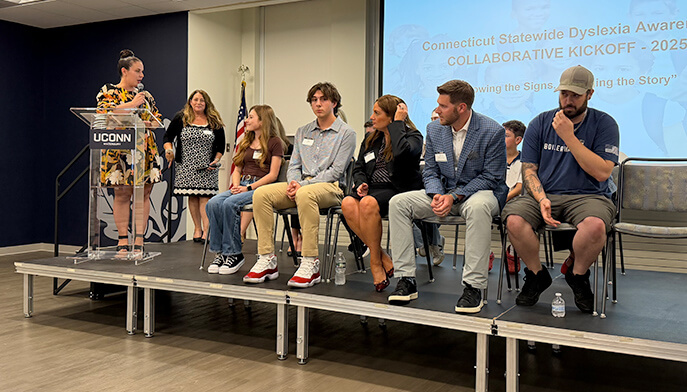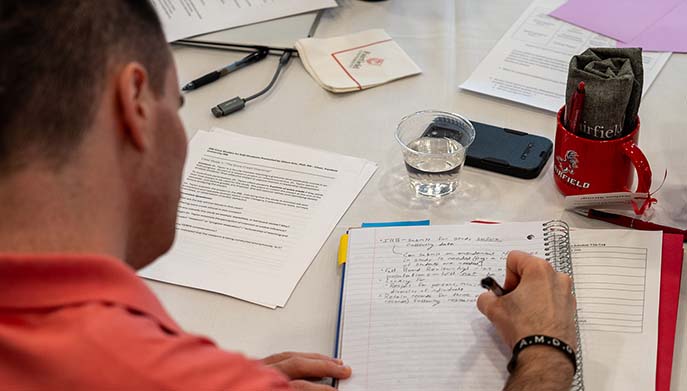Pursuing a Doctorate of Education in Educational Leadership (EdD) is not limited to one kind of professional or academic path.
In fact, one of the most dynamic aspects of an EdD program is the variety of people it brings together—leaders from schools, nonprofits, corporations, and community organizations who all share a commitment to improving education and equity.
Students in Fairfield University’s EdD in Educational Leadership reflect this diversity. With wide-ranging professional experience and research interests that span social justice, policy, and innovation in educational settings, they form a community united by purpose rather than background. According to Dr. Emily Smith, Professor of Psychological & Educational Consultation at Fairfield, there is a huge range of professionals in this field who want to be leaders. “I am continually pleased at how many people are interested in taking this leap and embracing the diversity. For example, we have school psychologists, university professors, a director of custodial services, and people who work in student affairs in the EdD program.”
This mix of perspectives enriches the learning environment, encouraging students to see education through new lenses and apply theory to real-world contexts. Dr. Smith added, “One of the things that was important to us in designing the program is that it’s not intended to be a stepping stone to leave your role, but rather it is a stepping stone to create positive change in your role.”
Who Pursues an EdD?
The Doctor of Education in Educational Leadership attracts professionals at many stages of their careers—teachers, principals, higher education administrators, nonprofit executives, and even business professionals transitioning into education.
A Degree for Experienced Leaders
Unlike traditional education programs aimed at those entering the classroom, the EdD program appeals to those already engaged in leadership or organizational development. Most students bring several years of leadership experience and are motivated to strengthen their leadership skills while deepening their understanding of how systems work.
Many come from educational organizations, such as K–12 schools and universities, while others work in related fields—health care, corporate training, or community advocacy—where learning and human development are central.
Interdisciplinary Learning Experiences
In Fairfield’s Education Leadership Program in the School of Education & Human Development, students learn alongside peers from diverse sectors. This interdisciplinary cohort model encourages collaboration and critical reflection. Classroom discussions draw from real-world learning experiences, allowing students to analyze problems of practice through the lens of their own professions.
There is no single “type” of EdD student. The richness of the program comes from the intersection of their experiences—each participant brings a unique perspective that contributes to the collective inquiry process.
Connecting Backgrounds to Research
A defining feature of any EdD program is the emphasis on applied scholarship. Students use their professional contexts as the foundation for their EdD research topics, connecting theory and practice in meaningful ways.
Common Research Themes
Reviewing the DigitalCommons@Fairfield collection of dissertations reveals just how varied these topics can be. Examples of EdD research topics include:
- Advancing social justice leadership in independent schools
- Examining strategies for improving teacher retention in under-resourced districts
- Exploring mentoring models for women in educational leadership
- Investigating the role of empathy in effective school administration
- Assessing inclusion and belonging practices in higher education
These themes demonstrate how students’ professional experience directly shapes their research. A school administrator may study policy implementation, while a nonprofit director might examine organizational culture or leadership development.
Applying Research Methods to Real Challenges
Students pursuing the Doctorate of Education in Educational Leadership learn to conduct rigorous inquiry through courses that teach advanced research methods. The focus is not just on generating knowledge, but on solving problems of practice—issues that emerge in real educational settings.
By combining evidence-based analysis with lived experience, students produce dissertations that inform both scholarship and day-to-day leadership decisions.
Diverse Student Paths: From the Classroom to Community Impact
The range of professional trajectories among EdD students is remarkable. Some are school principals eager to create inclusive learning environments. Others are policy advocates seeking to expand access to quality education. Many are higher education professionals who want to transform systems and support equity at the institutional level.
K–12 and Higher Education Leaders
For teachers and school administrators, pursuing an Ed.D. in Educational Leadership can deepen their understanding of systemic change. Through coursework and professional development, they explore how policy, finance, and organizational culture shape learning outcomes. Graduates often bring the learning back to their classrooms to lead from within their contexts, while some choose to advance into district-level leadership or education consulting roles.
Nonprofit and Community Leaders
Students from nonprofit sectors apply their degree program learning to issues such as after-school programming, literacy initiatives, or community engagement. The educational leadership doctorate prepares them to design and evaluate programs that make measurable differences in people’s lives.
Corporate and Organizational Leaders
Some students come from the corporate world, particularly in human resources or organizational training. Their learning experiences in leadership theory and adult learning enable them to bring educational best practices into business and professional environments.
The Value of Multiple Perspectives
These distinct pathways enrich the EdD program experience. When students with different professional and academic backgrounds share their insights, everyone benefits. Discussions on leadership ethics, change management, and social justice become more nuanced, preparing graduates to lead across diverse contexts.
Skills and Competencies Developed
An educational leadership doctorate goes beyond theory—it builds tangible skills that empower graduates to lead transformation in educational organizations and beyond.
Leadership and Change Management
Students refine leadership skills essential for driving systemic change. They learn to navigate complexity, manage diverse teams, and align decisions with mission and values.
Equity and Advocacy
Given the program’s emphasis on social justice, students develop the ability to identify inequities and advocate for fair policies and practices. This focus helps future leaders champion inclusive educational environments that help expand equity for all.
Research and Policy Analysis
Courses in research methods and policy analysis train students to evaluate programs, measure impact, and contribute to the evidence base guiding educational reform.
Communication and Collaboration
Because most EdD students work in collaborative environments, effective communication is central to success. The programs emphasize how to lead dialogues, facilitate stakeholder engagement, and translate research findings for broad audiences. Dr. Smith says that “the sense of community among the doctoral students at Fairfield is amazing. During the summer residency, they form critical friend groups and support networks that they rely on throughout the program.”
Research in Action: Bridging Scholarship and Practice
A doctoral program encourages students to use their workplaces as laboratories for innovation. By integrating coursework with professional projects, students develop interventions that can be implemented and evaluated in real time.
For example:
- A superintendent might create a professional learning model for new principals.
- A university administrator could examine equity gaps in student advising.
- A corporate trainer might assess the impact of coaching on leadership outcomes.
These applied studies embody the program’s mission: to prepare public-minded leaders who merge research and practice to drive meaningful change.
A Community of Purposeful Leaders
The Doctor of Education in Educational Leadership attracts an exceptional mix of individuals—each bringing their own story, motivation, and vision for change. From school districts to nonprofit organizations, from higher education to the private sector, these students demonstrate that there is no single pathway to leadership in education.
What unites them is a shared belief in the power of learning, equity, and service. Their diverse backgrounds don’t just enrich the EdD program; they define it.
For professionals wondering whether their experience fits within a doctoral program in educational leadership, the answer is almost always yes. Programs like Fairfield’s EdD in Educational Leadership are designed precisely for those who want to merge professional experience with advanced scholarship—and to turn that combination into lasting impact.




